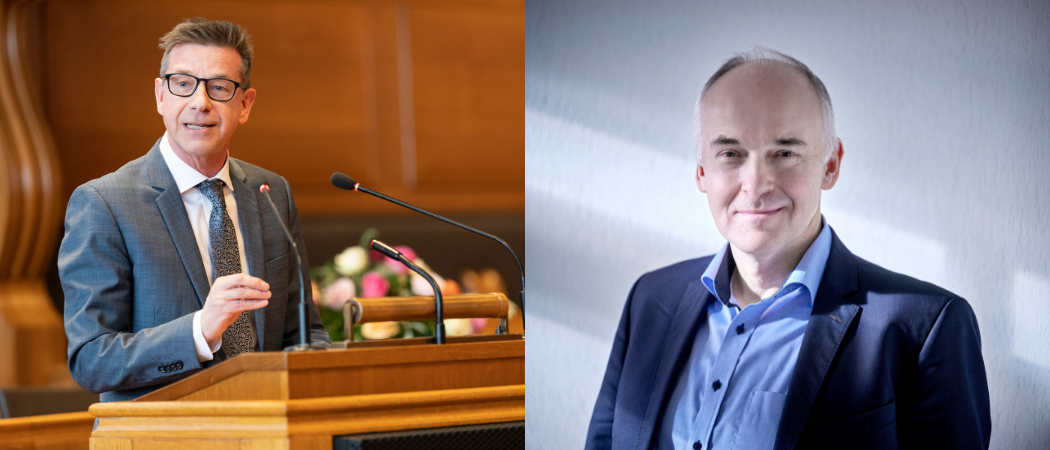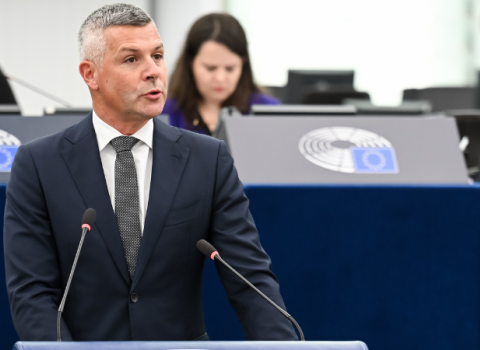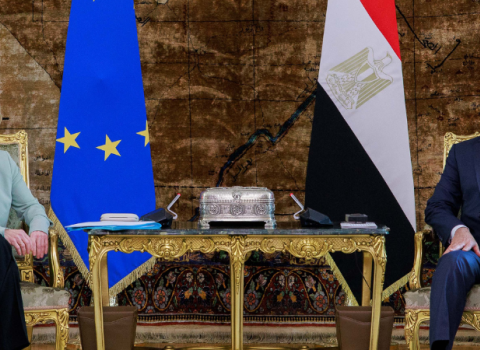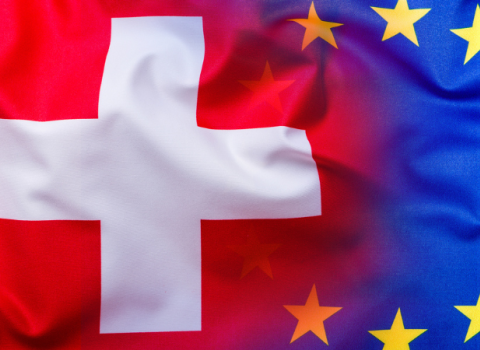A deal to allow the country to rejoin is expected this week. But scientists will have to campaign for it to be ratified by voters

On the left, Matthias Egger, outgoing president of the Swiss National Science Foundation’s (SNSF) research council, and on the right, Torsten Schwede, his successor from 2025. Photo credits: SNSF
Switzerland could once again fall out of the EU’s Horizon Europe research programme if voters reject a wider, underpinning deal in a likely 2026 or 2028 referendum, the leaders of the country’s biggest research funding agency have warned.
An overarching deal between Brussels and Bern expected this week should allow Swiss researchers to finally fully participate in Horizon Europe, after years of political squabbles locked them out of certain parts of the programme since it began in 2021.
But this expected higher-level deal will very likely go to a referendum in a few years. If voters reject the deal, Switzerland will again be out of Horizon Europe and “go back to square one,” said Matthias Egger, the outgoing president of the Swiss National Science Foundation’s (SNSF) research council.
In 2014, the country temporarily lost full access to Horizon 2020, the predecessor programme, after Swiss voters passed an anti-immigration referendum.
Since then, Swiss involvement has been “stop and go,” said Egger. “People now have understood, if you go to Switzerland, you never know whether you'll have access to Horizon Europe, the framework programmes, and that's a very bad message,” he said.
“So we really hope that this time, it will be long term, but that's not certain at all, because there will be a referendum,” he said.
However, Egger said that the expected deal will likely be more palatable to voters than the previously mooted overarching agreement, which Switzerland walked away from negotiating in 2021. “I'm more optimistic,” he said.
The geopolitical situation, with Russia’s invasion of Ukraine and the uncertainty of a second Donald Trump presidency in the US, could also “create an awareness that Switzerland has to work with its neighbours,” said Egger.
But more than two years out, it’s hard to predict what Swiss voters will decide. The right-wing populist Swiss People’s Party, which topped the polls in last year’s federal elections, is already campaigning against the deal.
If voters reject the deal, causing Switzerland to be barred from Horizon Europe again, projects with Swiss researchers shouldn’t stop “overnight”, said Egger. “Usually running projects run to conclusion,” he said.
And the Swiss government, as it did in 2021, would also likely step in with national money to allow their scientists to continue to participate in Pillar II consortia – typically groups of academics and companies solving more applied problems – using their own funding, said Torsten Schwede, who takes over as SNSF president from 2025.
In other words, “you get free money from Bern” by including a Swiss consortium member, he said.
The damage to Swiss participation would be “psychological,” rather than financial. Dropping out again after a referendum would create a “very uncertain situation that you can't control, that is very complicated from an administrative point of view,” Schwede said.
Blow cushioning
If Switzerland dropped out again, national replacement funding and schemes would be likely to kick in again, as they did in 2021. But this has only cushioned the blow of exclusion to a certain extent
The SNSF set up grants mimicking the European Research Council’s (ERC) and Bern gave researchers money to join Pillar II consortia. Swiss participation in Pillar II “remains very stable,” said Laure Ognois, head of international cooperation at SNSF, despite Swiss researchers having to use this domestic money to join.
At least at Basel University, where Schwede was vice rector for research until summer 2024, participation held up. “The researchers really made an extra effort to stay in these networks,” he said.
But exclusion from certain quantum technology calls in 2021 on sensitivity grounds had “really dramatic impacts,” he said, marking a “hard blow “ on colleagues, even though Bern set up its own quantum funding scheme in response.
ERC exclusion
Researchers have been largely excluded from applying to the ERC, for example. The SNSF replacement grants, while welcome, couldn’t offer the same networks and follow-on grants of the ERC, said Schwede. “As a young researcher, it's kind of a dead end,” he said. “It's something that came up always when we were recruiting new professors on the junior level,” he said.
“It certainly mitigated some of the damage, but it could not replace,” said Egger.
Swiss researchers have also been barred from leading research consortia in Pillar II of the programme.
Swiss academics were also forced to hand over leadership of Pillar II consortia, and at least one start-up has moved to Vienna to be able to access EU money, Egger said. “It's a painful weakening of influence and capability of shaping the programme,” he added.
Ideas for FP10
Should Swiss voters reject the new deal with the EU, it could also prevent Switzerland joining the successor programme to Horizon Europe, Framework Programme 10, which is currently being cooked up in Brussels. It’s set to start in 2028.
Still, this isn’t stopping the SNSF from putting forward its own ideas for the programme. One of its chief concerns is a European Commission proposal to allow dual-use research as part of the programme.
The SNSF isn’t against doing research with military potential on principle. Rather, it’s worried about making administration, outside participation and research security more complex if FP10 is no longer explicitly civilian.
“We believe that it would be wise to separate the two things,” said Egger. Some researchers may also be “reluctant” to join the programme if it isn’t fully civilian, he added.
A more defence-focused research programme could also cause problems for historically neutral Switzerland. A referendum is currently scheduled to define Swiss neutrality, after Bern joined EU sanctions against Russia following Moscow’s invasion of Ukraine.
Swiss scientists might get themselves into “political swamps if a programme is too closely associated to a certain military application,” said Schwede.





 A unique international forum for public research organisations and companies to connect their external engagement with strategic interests around their R&D system.
A unique international forum for public research organisations and companies to connect their external engagement with strategic interests around their R&D system.